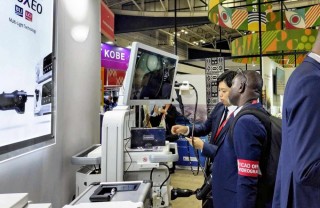Loading
Search
▼ Japanese Firms Expanding Medical Businesses in Africa, Aiming to Provide Quality and Sense of Security
- Category:Other
Japanese companies are expanding their medical businesses in the African continent, which has a population of about 1.5 billion. Amid massive investments by Chinese competitors, the companies are trying to leverage their technical prowess and reliability to promote their businesses in African countries, which are said to be facing such challenges as widespread infectious diseases and insufficient medical systems.
The Yokohama Declaration, adopted on the final day of The Ninth Tokyo International Conference on African Development (TICAD 9), called for addressing problems such as communicable diseases in Africa as a necessity.
During the three-day conference, many Japanese companies involved in medical work set up booths at a business exposition held at the venue.
Fujifilm Corp. displayed a portable X-ray imaging device, which can be carried in a medium-sized suitcase.
The battery-powered device makes it possible to take images in rural farming areas that have no electricity. The device has been introduced in Zambia, where tuberculosis is widespread. The firm aims to introduce the device to other countries in cooperation with local health authorities.
A public relations official of the Ghana Investment Promotion Centre expressed anticipation, saying Japanese firms give a sense of security and have many unique technologies.
Nutrition for mothers and children
The population in Africa is projected to increase to about 2.5 billion, about one-quarter of the global population, by 2050. While the continent is called the “last frontier,” where rapid economic development is expected, it often faces large-scale prevalence of infectious diseases, resulting in severe shortages of medical devices and hygiene supplies.
NEC Corp. has developed an app for medical questions to support heath checkups and nutrition guidance for mothers and children in Ghana, where malnutrition poses a severe problem.
The system is designed to digitalize results of health checkups of pregnant women, among others, and analyze and evaluate health conditions, including malnutrition and serious anemia, using smartphones and other devices.
Infectious diseases account for about 30% of deaths in Ghana, with Malaria in particular having become a societal problem. Malnourished children are said to have a higher risk of developing serious symptoms. The company believes improving nutrition among mothers and children in the country will help address the problem.
Additionally, many of the sanitary products in Africa are said to be of low quality, making it difficult to spread their use. Unicharm Corp. began producing sanitary products in Kenya in cooperation with Toyota Tsusho Corp.
The companies plan to set up a local joint venture in an effort to sell and spread the use of sanitary products, which will be low-priced and made at a reliable level of quality.
Chinese firms make presence known
Chinese firms have a strong presence in Africa, supported by economic clout. They are aggressively investing in infrastructure and resource development as well as in the field of health care.
Investments have been able to progress even though the danger of the so-called debt trap, under which China strengthens its diplomatic and policy controls on borrower countries when they are unable to repay debts, has been pointed out.
Meanwhile, the administration of U.S. President Donald Trump has disbanded US Agency for International Development, making it likely the country’s assistance to Africa will further taper off.
Japanese companies, which have handled many infrastructure projects there in the past, have been lagging behind Chinese competitors in recent years due to a decline in the number of official development assistance programs.
According to sources close to trading companies, however, some African government officials and company executives have said they want to avoid businesses dependent on China.
This month, Marubeni Corp. invested in a major pharmaceutical firm, which is doing business mainly in Kenya. Marubeni President Masayuki Omoto said, “As Japanese businesses can offer high quality and credibility, we believe it is time for Japanese firms to act.”
- August 25, 2025
- Comment (0)
- Trackback(0)


